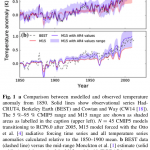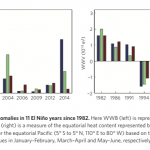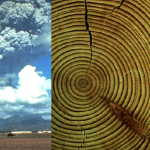climate models
Climate Models Accurately Predict Warming
Climate models employ piles of data and sophisticated computational techniques to predict what will happen in the future. Sometimes they predict what happened in the past as well. That is important to test the models (because we might know what happened in the past), or to fill in the blanks (we don’t always know exactly what happened in the past) or to understand complex climate systems better.
If you glance at the science denier rhetoric (mainly on blogs, you won’t find much in the peer reviewed literature because it isn’t good science) you’ll see…
Recently, a paper published in a Chinese journal of science by Monckton, Soon and Legates attracted a small amount of attention by claiming that climate science models "run hot" and therefore overrepresent the level of global warming caused by human greenhouse gas pollution. The way they approached the problem of climate change was odd. The Earth's climate system is incredibly complex, and climate models used by mainstream climate scientists address this complexity and therefore are also complex. Monckton et al chose to address this complexity by developing a model they characterize as "…
A new study seems to provide a better way to categorize El Nino climate events, and offers an explanation for how different kinds of El Nino events emerge.
El Nino is part of a large scale, very important climate phenomenon in the Pacific Ocean, generally referred to as the El Nino Southern Oscillation (ENSO). Over time (years) wind and water currents move heat into the upper levels of the Equatorial Pacific (La Nina). Then, over time (months) the heat comes back out – that is an El Nino. The effects can be dramatic. During El Nino years, trade winds and monsoons may behave differently than…
Mark Your Cosmic Calendar: 774/775
One wonders if anyone felt it. Did Charlemagne feel it as he led his forces across Pagan Saxon Westphalia, knocking down Irminsuls and making everyone pretend to be Christian or else? Did the people of Bagdad, just becoming the world’s largest city, notice anything aside from their own metro-bigness? Did the Abbasid Caliph Muhammad ibn Mansur al-Mahdi have the impression something cosmic was going on that year, other than his own ascendancy to power? Or was it mainly some of the Nitrogen molecules in the upper atmosphere that were changed, not forever but…
In the video below Gavin Schmidt gives a "TED Talk" on climate models, taking us from an overview of their construction to the resulting emergent processes and their skill at reproducing much more than a global average temperature trend.
Gavin is an excellent communicator and a true hero in humanity's fight against itself over the impending and tragic disruption of our global ecosystem services. Well worth the 12 or so minutes to watch!



